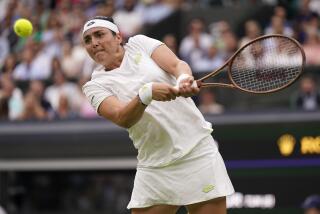Virginia Wade Bows Out in Style
- Share via
WIMBLEDON, England — No hearts, no flowers. No tears. There was some champagne in the press interview area, but that was about as emotional as it got.
Virginia (Our Ginny) Wade, in her 24th Wimbledon, played her last singles match here Monday.
When she lost to Pam Shriver--Our Pammy--Wade looked to the Royal Box to see if she should curtsy. No one was there.
But if the Royal Box was empty and Centre Court not quite full, Our Ginny, a week shy of her 40th birthday, still went out well, extending Shriver, the fifth-seeded player, before being beaten, 6-2, 5-7, 6-2.
She had a break point in the third set and she had the crowd cheering as of old.
“I cannot feel sad,” Wade said. “I’ve had more out of tennis and more fun out of playing Wimbledon, with all the excitement and emotion, than probably anybody.”
Wade had won her first two rounds here and said she wanted to go out against a top player. Shriver would do.
“On the changeovers,” Shriver said, “I made sure we went out together. That way, in my mind I could think half these people were cheering for me. Ha, ha.”
Wade played well, her service as sharp as ever, and she moved with a grace that was reminiscent of Ginny at her best.
Wade’s first appearance on Centre Court was in 1962, her first year in the tournament. She won her first match and went home to tell her father.
“I was coming down the stairs and my father was reading the newspaper and said, ‘Oh, you’re playing on Centre Court today,’ and I nearly fell down the stairs. I had to phone up and say I couldn’t go to school that day.”
She played Ann Hayden and lost, 6-3, 9-7. Fifteen years later, Wade would win at Wimbledon and Queen Elizabeth II presented her with the champion’s silver plate as a nation celebrated.
No Briton of either sex has won here since, and the pressure continues to build. It took Wade some years to handle it.
“Eventually, she turned it around to her favor,” said Billie Jean King, a contemporary and now a TV commentator. “It made her a better player.”
Wade says she was able to win in 1977 because some of the pressure had left her and moved to Sue Barker, then a world-class player.
“I had been almost rejected in a way,” Wade said. “They gave up on me.”
There may never have been a more dramatic moment at Wimbledon than Wade’s win on Centre Court. Monday’s end lacked the drama. But the memories were there.
“Wimbledon has grown and developed since I started playing,” Wade said. “But it still retains an aura. to me, playing tennis at Wimbledon on Centre Court is the most exciting thing in the world.”
More to Read
Go beyond the scoreboard
Get the latest on L.A.'s teams in the daily Sports Report newsletter.
You may occasionally receive promotional content from the Los Angeles Times.










